News & Events
Halala, halala, halala, Unisa
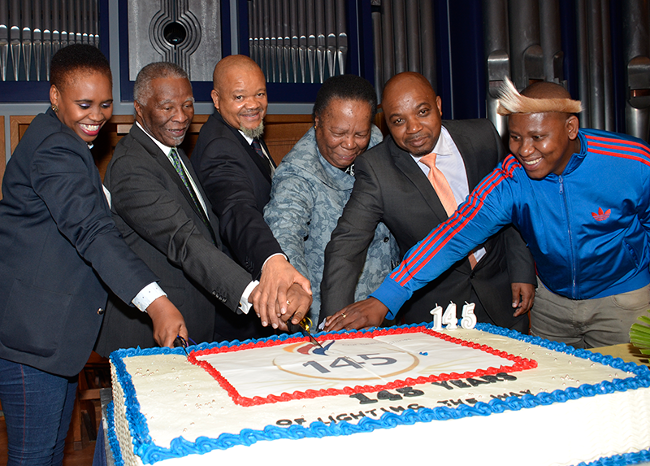
Zandile Sodladla (President: NSRC), HE Thabo Mbeki (Chancellor of Unisa), Prof. Mandla Makhanya (Principal and VC), Dr Naledi Pandor (Minister: DHET), Sakhi Simelane (Chairperson of Council), and Sabelo Mhlungu (President: Unisa Convocation) cut the birthday cake.
With drama, drumbeats, dancing, declamation, and sheer delight, Unisans celebrated the 145th birthday of the venerable elder of South African universities.
Delivering the keynote address, Dr Naledi Pandor, Minister of Higher Education and Training, said that Unisa had the institutional capacity and intellectual resources to make a critical contribution to the many important challenges confronting South Africa.
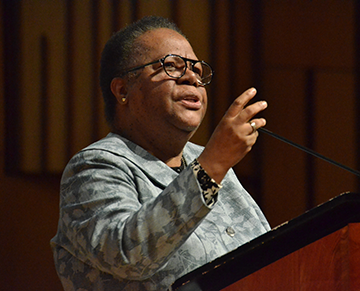
The success of our students must be at the heart of our mission, said Dr Naledi Pandor (Minister: DHET), delivering the keynote address at Unisa’s 145th birthday celebrations on 4 July 2018. “Because, after all, if our students don’t succeed, why do we exist?”
“Distance education and open learning have a major role to play in providing opportunity for people who are not able to study full time, including working people who need to upgrade and improve their qualifications and young people who are looking for a flexible way to study and, perhaps, to do so while in and out of work,” she said.
The minister pointed out that in South Africa, distance education accounts for just over one third of university enrolments, with the vast majority of distance enrolments at the university itself. “Over its 145-year history, Unisa has provided opportunities for a diverse range of students to access university studies, particularly those who could not or who were prevented from accessing traditional pathways. It has thus made a significant contribution in providing access, in particular, to students from marginalised groups of our society.”
The technological opportunities of the 21st century and the academic ability of the university, said Pandor, implied that Unisa could, with vision, imagination, and innovation, ensure that all its graduates become the greatest South Africans who have ever lived. “Becoming great means you don’t live by a grievance culture. It means you live by a culture of doing. I wish you another 145 years of great learning and teaching.”
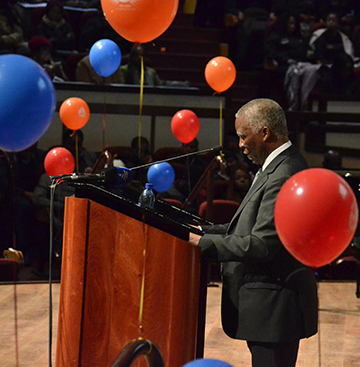
HE Thabo Mbeki (Chancellor of Unisa) “It is in the context of the imagined future that all of us will work to live up to the vision of reconstructing the institution as practically the African university, that I am honoured to salute all those staff, students, management, and workers of Unisa who will be the architects of this outcome.”
HE Thabo Mbeki, Chancellor of Unisa, echoed the minister’s words by saying that anybody interested in the development of the system of higher education in South Africa since the last quarter of the 19th century would be well advised to study the story of Unisa.
However, as he was quick to emphasise, the fact that the vision which inspires Unisa today is towards the African university shaping futures in the service of humanity, shows how far the original 1873 University of the Cape of Good Hope and its successor 1918 federal university had travelled.
He affirmed the common obligation shared by everyone who constituted today’s Unisa community to ensure that the university did, indeed, live up to this vision.
Growing from an African seed
Quoting the late Nigerian Professor Tijani M Yesufu, the chancellor said that the African university must ‘be made of a different and distinctive substance from the traditions of Western universities, and must evolve a different attitude and a different approach to its task. The truly African university must be one that draws its inspiration from its environment, not a transplanted tree, but growing from a seed that is planted and nurtured in the African soil.’
Professor Mandla Makhanya, Principal and Vice-Chancellor, picked up on the metaphor by asserting that Unisa’s roots were deeply embedded in African soil. “This university has nourished—and been nourished—by many generations of scholars, evident in the hundreds of thousands of Unisa graduates who represent every stratum in society and who are to be found in all echelons of society and public and private enterprise around the world—and who have served and achieved with distinction.”
Seetša sa rena se a Kganya. | Ilitha lethu liyakhanya. | Lebone la rona lea Kganya. | Tshedza tshashu tshi a penya. | Our beacon shines. | Lesedi la rona le a phatsima. | Uphawu lwethu lukhanyisa kude. | Helder skyn ons lig. | Luphawu lwetfu luyakhatimula. | Ikwekwezi yethu iyameruza. | Mfungho wa hina wu voninga kule.
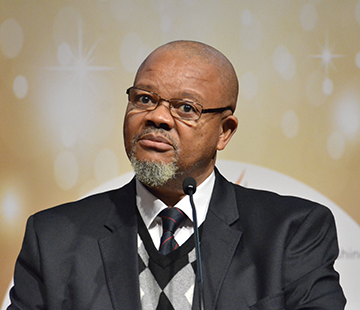
Prof. Mandla Makhanya (Principal and VC) “We are a university of the people and for the people in the broadest sense, and we will work together with anyone whose vision for our country and her people is consonant with Unisa’s vision…together we must ensure the kind of transformation that will take us forward to the desired end-state of quality and excellent education.”
The VC noted that while it was good to celebrate an illustrious legacy, it should not become a crutch for a lack of vision. Action focused on a vibrant, productive, and engaged future was needed. “That is why you will find that our strategy is firmly focused on the attainment of an unapologetically African university that is undergirded and driven by innovation, creativity, and deliberate transformation. Unisa aims to be a beacon of quality and excellence in teaching and learning, research and innovation, and community engagement at the vanguard of South Africa’s and Africa’s renewal.”
Sakhi Simelane, Chairperson of Council, had no doubt that the 145 milestone that Unisa was celebrating was a reflection of its emergence, trials, tribulations, triumphs, and resiliencies. He said that while Unisa had to be responsive to the demands of diverse stakeholders, it also had to avoid acting like a weather vane, responding to each and every wind blowing. “There are times when a university has to lead in public discourse based on the accumulation of cutting-edge research while remaining obedient to its diverse constituencies.”
*By Sharon Farrell
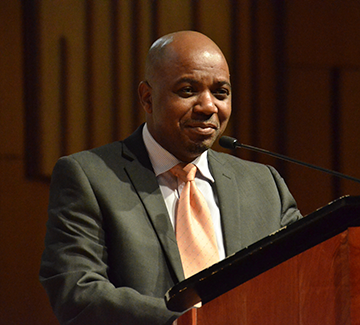
Sakhi Simelane (Chairperson of Council) “We are an institution that has dedicated itself to be truly African in ethos while globally competitive. We might have been the first institution of higher education here in South Africa that was never afraid of the resurgences of decolonisation and Africanisation.”
Publish date: 2018/07/10
